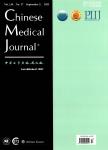Liver targeting and the delayed drug release of the nanoparticles of adriamycin polybutylcyanoacrylate in mice
Liver targeting and the delayed drug release of the nanoparticles of adriamycin polybutylcyanoacrylate in mice作者机构:Department of Tumor Xiangya Hospital Central South University of China Changsha 410008 China National Key Laboratory of Nanobiological Technology Central South University of China Changsha 410008 China Medical Research Center Xiangya Hospital Central South University of China Changsha 410008 China
出 版 物:《Chinese Medical Journal》 (中华医学杂志(英文版))
年 卷 期:2006年第119卷第15期
页 面:1287-1293页
核心收录:
学科分类:1002[医学-临床医学] 100201[医学-内科学(含:心血管病、血液病、呼吸系病、消化系病、内分泌与代谢病、肾病、风湿病、传染病)] 10[医学]
基 金:This study was supported by a grant from the National 863 Program of China (No. 2002AA216011)
主 题:polybutylcyanoacrylate nanoparticles fiver targeting adriamycin
摘 要:Background Liver targeting drug delivery systems can improve the curative effects and relieve the cytotoxicity of the chemotherapy drugs in the treatment of liver diseases. Nanoparticles carrying therapeutic drugs are currently under hot investigation with great clinical significance. This study was aimed to investigate the different tissue distribution of the adriamycin polybutylcyanoacrylate nanoparticle (ADM-PBCA-NP) in the mice body after an injection via lateral tail vein, and to study the liver targeting effects of ADM-PBCA-NP in different diameters on normal mice liver. Methods One hundred and eighty Kunming mice were randomly divided into 6 groups with 30 mice in each group (5 treatment groups of ADM-PBCA-NP in the different diameter ranges, non-conjugated free adriamycin injection was employed as the control group). A single dose of either conjugated or free adriamycin equaled 2 mg/kg of body weight was delivered via the tail vein. Five mice in each trail were sacrificed at 5, 15, 30 minutes, 1, 5 and 12 hours postinjection, respectively. The adriamycin cOncentrations in the respectively collected liver, kidney, spleen, heart, lung and plasma were demonstrated using a high performance liquid chromatography with fluorescence detector. Results Compared with the control group, adriamycin was hardly detected in the heart muscle of the treatment groups (P〈0.05). The nanoparticle-conjugated adriamycin was cleaned up quickly from the kidney tissue. The adriamycin concentrations of the mice liver and spleen in the experimental groups were significantly higher than that in the control group, except for the group with the nanoparticles diameters of (22.3 ±6.2) nm (P〈0.05). The ADM-PBCA-NP in (101.0±20.3) nm diameter had the highest liver distribution, and the second highest adriamycin distribution in liver was the group of (143.0±23.5) run diameter (P〈0.05). Moreover, adriamycin was released slowly in the liver during the detection period in the experimental groups.



